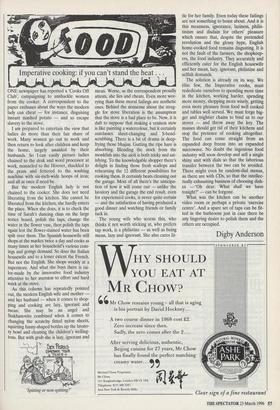Imperative cooking: if you L. can't stand the hea
ONE newspaper has reported a 'Cooks Off Club', campaigning to unshackle women from the cooker. A correspondent to the paper enthuses about the ways the modern lady can cheat — for instance, disguising instant mashed potato — and so escape slavery to the stove.
I am prepared to entertain the view that ladies do more than their fair share of work. Many women go out to work and then return to look after children and keep the home, largely unaided by their husbands. So I can easily picture ladies chained to the desk and word processor at work, manacled to the Hoover, shackled to the pram and fettered to the washing machine with six-inch-wide hoops of iron; and all at once if need be.
But the modern English lady is not chained to the cooker. She does not need liberating from the kitchen. She cannot be liberated from the kitchen; she hardly enters the place. When she does, it is to check the time of Sarah's dancing class on the large notice board, polish the taps, change the water in the flower vase, then polish the taps again lest the flower-stained water has been spilt over them. The Spanish housewife still shops at the market twice a day and cooks as many times as her household's various com- ings and goings demand. So does the Italian housewife and to a lesser extent the French. But not the English. She shops weekly at a superstore. And what she buys there is tai- lor-made by the innovative food industry attentive to her aversion to effort and hard work at the stove.
As this column has repeatedly pointed out, the modern English wife and mother and her husband — when it comes to shop- ping and cooking are lazy, ignorant and mean. She may be an angel and Stakhanovite combined when it comes to changing the scratchy fitted nylon sheets, squirting funny-shaped bottles up the lavato- ry bowl and cleaning the children's welling- tons. But with grub she is lazy, ignorant and `Spitting or non-spitting?' mean. Worse, as the correspondent proudly attests, she lies and cheats. Even more wor- rying than these moral failings are aesthetic ones. Behind the nonsense about the strug- gle for stove liberation is the assumption that the stove is a bad place to be. Now, it is daft to suppose that making a venison stew is like painting a watercolour, but it certainly outclasses sheet-changing and S-bend- scrubbing. There is a bit of drama in deep- frying those bhajias. Gutting the ripe hare is absorbing. Blending the stock from the monkfish into the aioli is both tricky and sat- isfying. To the knowledgable shopper there's delight in finding those fresh scallops and rehearsing the 12 different possibilities for cooking them. It certainly beats cleaning out the garage. Most of all there's the anticipa- tion of how it will come out — unlike the lavatory and the garage the end result, even for experienced cooks, is never quite certain — and the satisfaction of having produced a good dinner and watching friends or family tuck in.
The young wife who scorns this, who thinks it not worth sticking at, who prefers tap work, is a philistine — as well as being mean, lazy and ignorant. She also cares lit- tle for her family. Even today these failings are not something to boast about. And it is this meanness, ignorance, laziness, philis- tinism and disdain for others' pleasure which ensure that, despite the pretended revolution and the glossy hype, English home-cooked food remains disgusting. It is not the fault of the farmers, the shopkeep- ers, the food industry. They accurately and efficiently cater for the English housewife and her mean, lazy, ignorant, philistine and selfish demands.
The solution is already on its way. We elite few, the Imperative cooks, must rededicate ourselves to spending more time in the kitchen, working harder, spending more money, shopping more wisely, getting even more pleasure from food well cooked and tables well served. We must forge big- ger and mightier chains to bind us to our stoves — and throw away the key. The masses should get rid of their kitchens and stop the pretence of cooking altogether. The food can come straight from an expanded deep freeze into an expanded microwave. No doubt the ingenious food industry will soon develop and sell a single shiny unit with dials so that the laborious transfer between the two can be avoided. There might even be random-dial menus, as there are with CDs, so that the intellec- tually exhausting business of choosing dish- es — 'Oh dear. What shall we have tonight?' — can be forgone.
What was the kitchen can be another video room or perhaps a private 'exercise centre'. And a spare set of taps can be fit- ted in the bathroom just in case there be any lingering desire to polish them and the others are occupied.
Digby Anderson


































































 Previous page
Previous page